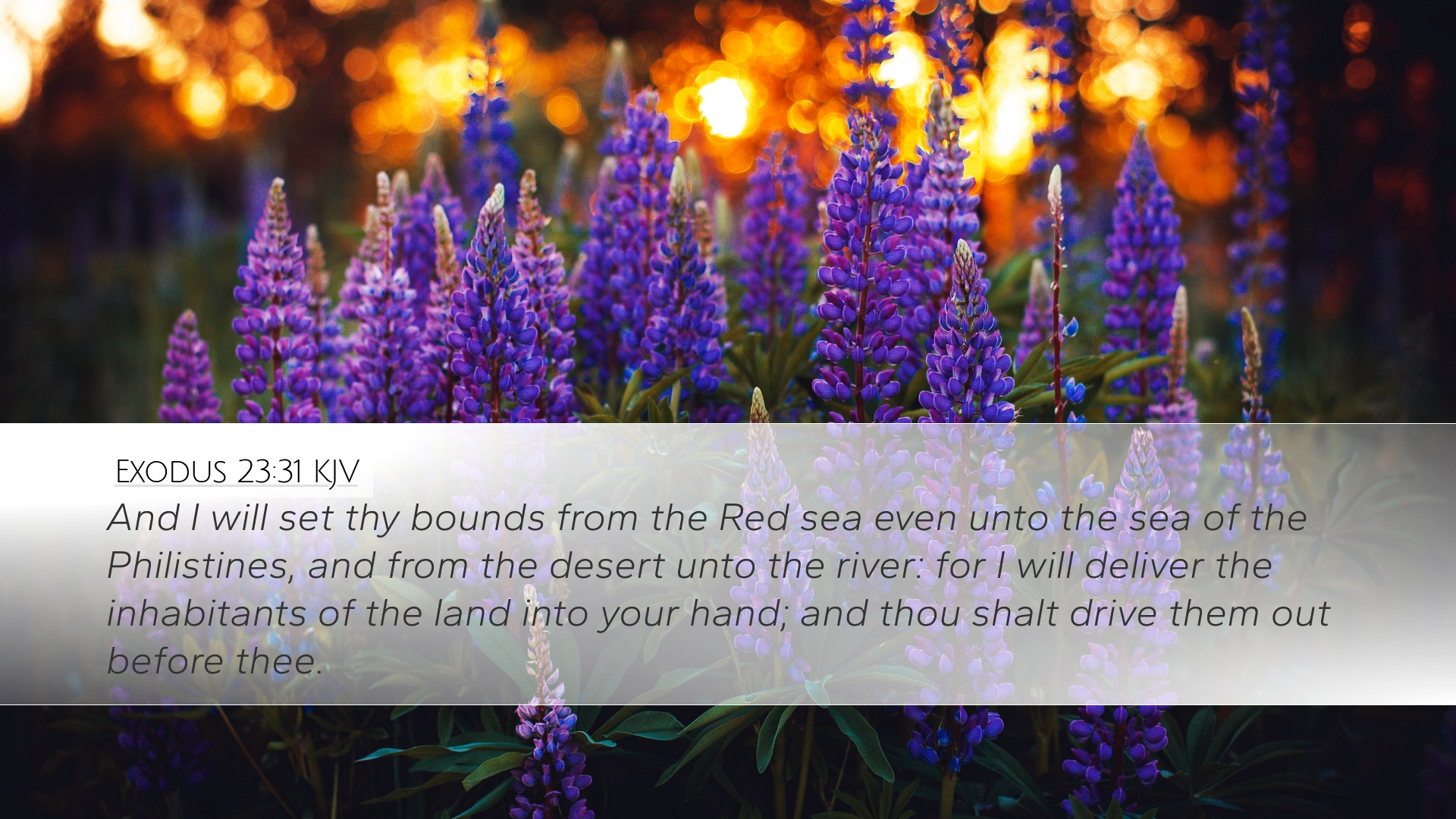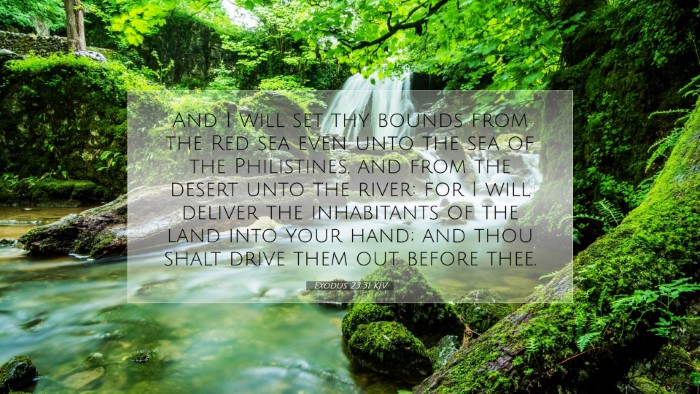Commentary on Exodus 23:31
Verse Analysis: Exodus 23:31 states, "And I will set thy bounds from the Red sea even unto the sea of the Philistines, and from the desert unto the river: for I will deliver the inhabitants of the land into your hand; and thou shalt drive them out before thee." This passage outlines God's promises to the Israelites regarding the land of Canaan and serves as a significant component of the covenant between God and His chosen people.
Historical Context
The Israelites, having been liberated from Egyptian bondage, were journeying toward the Promised Land. God's promise in this verse not only reassures them of His presence and provision but also delineates the boundaries of their inheritance. The geographical markers set forth indicate a territory that was vast and filled with potential. These assurances were crucial as they prepared to face the challenges of conquering and settling in a land already inhabited by other nations.
Theological Implications
Divine Sovereignty: This verse reflects God's sovereignty in the affairs of nations. He is not just making a promise of land; He is establishing the reality that He will remove the current inhabitants, ensuring the Israelites can claim what He has designated for them. This implies that God's will and plan for His people are inevitable and that He will enact His judgments upon those who oppose His purpose.
Faith and Obedience: While God's promise is certain, it also requires a response from the Israelites. They are called to actively engage in the process of driving out the inhabitants. This highlights a recurring theme throughout Scripture: faith in God's promises often involves human action and obedience. Their ability to enjoy the full benefits of the promise was contingent upon their willingness to act in faith.
Commentary Insights
Matthew Henry's Commentary
Henry notes the specific boundaries set by God and sees this as a sign of His providential care. He highlights that the land promised is not merely for possession but signifies God’s desire for His people to have a distinct and holy home where they can worship Him freely. The detail of the geographical boundaries emphasizes God's omniscience and the assurance that He is in control of every aspect of their journey. Moreover, Henry discusses the moral obligation of the Israelites to uphold righteousness as they inherit the land, cautioning against the dangers of becoming indistinguishable from the pagan inhabitants.
Albert Barnes' Notes on the Bible
Barnes provides insight into the significance of the phrase "I will deliver the inhabitants of the land into your hand." He emphasizes that God's delivery is not merely about land acquisition but also about spiritual victory over sin and idolatry that the inhabitants represent. This battle for the land mirrors the spiritual battles faced by believers today. Barnes relates the promise of God's assistance in driving out the “inhabitants” as symbolic of the Christian life where believers are called to contend against sinful tendencies and powers that seek to undermine their faith.
Adam Clarke's Commentary
Clarke discusses the historical context and geographical realities of the territories mentioned. He notes that the "Sea of the Philistines" refers to the Mediterranean Sea and illustrates the extent of the promised land. Clarke also points to the obligations Israel had to God in terms of worship and community life. He emphasizes the divine instructions for complete separation from the pagan practices of the surrounding nations as vital for maintaining their covenant relationship with God. Clarke's work shines a light on the practical implications of God's promise that involve the daily walk of faith by the Israelites.
Practical Applications
This passage encourages contemporary readers, particularly pastors, students, and theologians, to consider the vastness of God's promises and the reality of spiritual warfare. It invites reflection on the following:
- Understanding Boundaries: Just as God set geographical boundaries for the Israelites, believers today must understand their own spiritual boundaries, ensuring they remain separate from influences that may lead them away from God.
- Engagement in Faith: The active involvement of the Israelites reminds modern believers that faith is not passive. Achieving spiritual victory requires diligent effort and obedience to God's commandments.
- Trusting God's Deliverance: The assurance of God's deliverance over opponents provides hope during times of struggle. Believers are reminded that God is actively working in their lives to fulfill His promises.
- Community Implications: The covenant aspect of the passage emphasizes the importance of the church as a community of believers striving together to experience the fullness of God’s promises.
Conclusion
Exodus 23:31 serves as a rich source of theological reflection and practical application for believers. It exhibits God's faithfulness to His promises while simultaneously putting forth a call to action for His people. Understanding and embracing this verse deepens one's appreciation for God's character, His sovereign plans, and the active role He desires for His people in realizing those plans. Moving forward, this passage becomes a clarion call to hear, heed, and engage with the God who delivers and equips His people for the inheritance He has promised.


